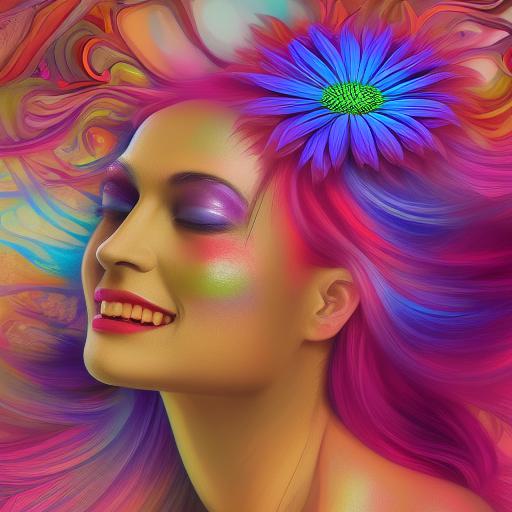How to write this prompt?
Here’s a breakdown of the prompt:
- Artwork description: The prompt begins with a description of the artwork that is to be generated. It is a digital 2D fantasy psychedelic painting of a woman holding a laughing flower. This sets the tone and style for the image and gives the AI a clear idea of what is expected.
- Composition: The prompt describes the composition of the image as a low angle lens shot with the woman standing in front of a colorful mural. This provides specific details about the camera angle and the setting for the scene.
- Technical specifications: The prompt mentions that the image should be rendered in 8k UHD with ultra-realistic and highly detailed using Houdini render. This tells the AI what resolution and level of detail are required for the image and which rendering software should be used.
- Lighting: The prompt also specifies that the image should have a dramatic backlight to create a glowing effect around the woman and the flower. This provides specific instructions on the lighting setup for the scene.
- Bokeh effect: The prompt mentions that there should be a bokeh effect in the background. This refers to the out-of-focus areas of the image and provides an additional visual element to the scene.
Each individual part of the prompt influences the final image by providing specific details and instructions for the AI to follow. By giving clear instructions on the composition, technical specifications, lighting, and visual effects, the prompt helps the AI create a cohesive and visually striking image.
What is an AI image prompt and how is it used in creating digital artwork?
An AI image prompt is a set of instructions provided to an artificial intelligence system to generate a particular type of digital artwork. The prompt includes details about the composition, lighting, visual effects, and other technical specifications for the image. The AI then uses these instructions to create a unique image based on the provided prompt.
How to use Houdini render to create ultra-realistic digital artwork?
Houdini render is a powerful software used for rendering 3D graphics and visual effects. To use it for creating ultra-realistic digital artwork, one must first set up the scene with the desired elements, such as models, lighting, and textures. Then, Houdini render can be used to render the image at a high resolution with advanced lighting and shading techniques to achieve a photorealistic look.
Why is the use of AI in creating digital artwork becoming more popular?
The use of AI in creating digital artwork is becoming more popular due to the increased efficiency and speed it offers. AI can quickly generate a large number of variations based on a single prompt, allowing artists to explore new creative directions in less time. Additionally, AI can learn from past examples and improve its output over time, making it a valuable tool for artists and designers.
Do I need to have technical knowledge or programming skills to use AI art generation prompts?
No, you do not necessarily need technical knowledge or programming skills to use AI art generation prompts. AI-powered art generation tools are becoming increasingly accessible and user-friendly, with many platforms offering intuitive interfaces that allow artists and designers to input prompts and receive generated images without the need for technical expertise. However, having a basic understanding of image composition, color theory, and visual design principles can still be helpful in creating high-quality AI-generated artwork.
Are there any copyright issues with using AI-generated art?
The use of AI-generated art can raise potential copyright issues. Depending on the source material used to train the AI system, the generated art may be subject to copyright protections. Additionally, if the AI-generated art is created using copyrighted images or other intellectual property without permission, there may be legal issues around its use and distribution. It is important to understand the source of the training data used for the AI system and to obtain any necessary permissions or licenses before using AI-generated artwork in commercial or public settings. However, in some cases, the generated art may be considered transformative enough to qualify as fair use or other exceptions under copyright law, and it is recommended to seek legal advice if there are any doubts about the legality of using AI-generated art.
Visual Paradigm Online is a powerful design tool that enables users to seamlessly integrate AI-generated art into their graphic designs, resulting in visually stunning and engaging graphics with just a few clicks. With its user-friendly interface and an extensive collection of design templates and assets, Visual Paradigm Online offers a convenient and effortless way to experiment with various styles and layouts until you achieve the perfect combination for your project.


